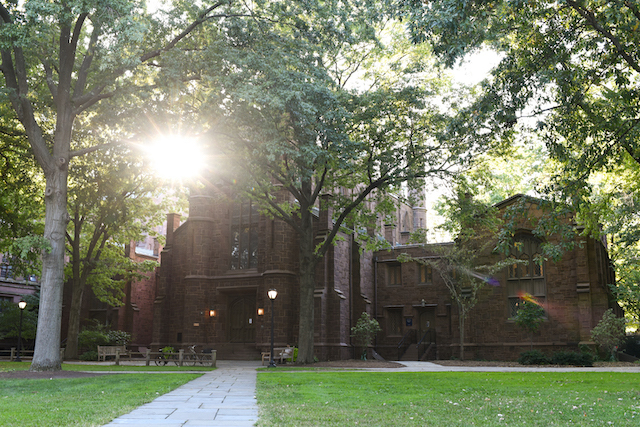Dwight Hall discusses how to engage with New Haven
Dwight Hall analyzes approaches for students to volunteer in New Haven.

Ryan Chiao, Senior Photographer
The Dwight Hall Center for Public Service and Social Justice discussed the history of economic and racial inequity in New Haven and possible methods for addressing such inequities in a Thursday night seminar for Yale students and affiliates.
The Sept. 30 seminar “Understanding New Haven: A Framework for Community Engagement” was led by Peter Crumlish, executive director and general secretary of Dwight Hall, who is originally from New Haven. During the information session, Crumlish discussed how to ethically engage in the broader New Haven community with an egalitarian — rather than hierarchical — mindset, and with knowledge of New Haven’s history. Crumlish suggested that students approach community service with two key principles in mind: community agency and reciprocity. There were four in-person attendees at the discussion, including two from the News. The event could be attended virtually, and was open to all Yale students and affiliates.
“A community is not a place, it’s not a location,” Crumlish said. “It’s a thing, and it’s a thing that has to be built.”
The seminar began with the goal of evaluating how Yale engages with the New Haven community through volunteer service. At the core of this evaluation was an understanding of the University’s history — opening with the knowledge that Yale is situated on the land of the Quinnipiac people.
Crumlish broadly outlined the history of New Haven — the town’s establishment by the English Puritans, economic development during the Industrial Revolution and expansion due to the arrival of immigrants after the Civil War and into the second World War. Just as New Haven developed from a colony into a modern city, Yale also grew from a school of ministers in Saybrook, Connecticut to a world-renowned research university.
“We want to understand our own history and how it connects to other people,” Crumlish said.
Dwight Hall, founded in 1886 as the Yale University Christian Association, initially aimed to help the New Haven community through missionary work. In the late 1960s, Dwight Hall’s Summer Fellowship began in an effort to address the disconnect between Yale and the broader New Haven community. Students in the fellowship were meant to learn from New Haven.
“I think Dwight Hall always tries to engage with New Haven, not to say that it’s perfect by any means,” said Alvaro Perpuly ’23, outreach coordinator for the Dwight Hall Executive Committee and former News reporter. “A lot needs to [be] worked over with the relationship between Yale and New Haven.”
Perpuly added that the goal of volunteering should be “really trying to fit the needs of other people.” He said that, instead of coming in as “saviors,” students should come in as collaborators.
Crumlish also discussed strategies that Yale students should keep in mind when engaging with the broader New Haven community. A student should think of what assets people have, instead of reducing them to their problems, Crumlish said. He added that the most effective community projects incorporate community control over the process and vision of the project, rather than it being an independent endeavor.
Crumlish also talked about the barriers that undergraduates face when becoming a part of the New Haven community in their four years as a student. He urged students to examine and question their relationship with some of their identities.
“Some people see [their identity as a Yale student] as a scarlet letter and that that we have to hide it,” Crumlish said. “For some people, it’s a central part of their identity.”
According to Crumlish, while neither of these extremes are helpful, it is important for Yale students to think of the way they try to enter communities, especially how they interact with existing power imbalances.
Like many other organizations, Dwight Hall experienced changes during the pandemic, but recently reverted back to in-person programming. Thursday’s seminar marked the return to face-to-face interaction, which left many participants eager for more.
“I’m really looking forward to getting more involved with the space and the people,” Ilana Zaks MUS ’22 told the News after the event.
Dwight Hall was incorporated in 1898 as an independent, non-profit educational and religious organization. It is the largest community service organization on campus, with over 70 affiliated organizations.







